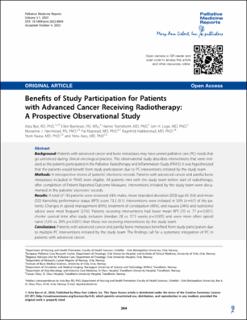Benefits of Study Participation for Patients with Advanced Cancer Receiving Radiotherapy: A Prospective Observational Study
Bye, Asta; Bjerkeset, Ellen; Stensheim, Hanne; Loge, Jon Håvard; Hjermstad, Marianne Jensen; Klepstad, Pål; Habberstad, Ragnhild H; Kaasa, Stein; Aass, Nina Kathrine
Peer reviewed, Journal article
Published version

View/
Date
2022Metadata
Show full item recordCollections
Abstract
Background: Patients with advanced cancer and bone metastases may have unmet palliative care (PC) needs that go unnoticed during clinical oncological practice. This observational study describes interventions that were initiated as the patients participated in the Palliative Radiotherapy and Inflammation Study (PRAIS). It was hypothesized that the patients would benefit from study participation due to PC interventions initiated by the study team.
Methods: A retrospective review of patients' electronic records. Patients with advanced cancer and painful bone metastases included in PRAIS were eligible. All patients met with the study team before start of radiotherapy, after completion of Patient Reported Outcome Measures. Interventions initiated by the study team were documented in the patients' electronic records.
Results: A total of 133 patients were reviewed: 63% males, mean (standard deviation [SD]) age 65 (9.6) and mean (SD) Karnofsky performance status (KPS) score 73.2 (9.1). Interventions were initiated in 50% (n = 67) of the patients. Changes in opioid management (69%), treatment of constipation (43%), and nausea (24%) and nutritional advice were most frequent (21%). Patients receiving interventions had lower mean KPS (70 vs. 77 p < 0.001), shorter survival time after study inclusion (median 28 vs. 57.5 weeks p = 0.005) and were more often opioid naïve (12% vs. 39% p < 0.001) than those not receiving interventions by the study team.
Conclusions: Patients with advanced cancer and painful bone metastasis benefited from study participation due to multiple PC interventions initiated by the study team. The findings call for a systematic integration of PC in patients with advanced cancer.
